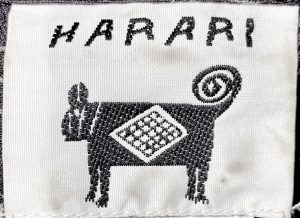In 1979, after crossing paths at an obscure flea market, Barbara Keller and Dan Harari combined their shared love of world travel, art, and vintage clothing to create Harari, their own line of exotic, boho chic clothing, prints and textiles. Dan was the financier and Barbara was the designer, drawing her inspiration from a love of Japanese kimonos, and the diverse cultures she experienced in her globe-trotting. The popular Harari store in Beverly Hills during the 1980s and 1990s, showcased a unique blend of clothing, hand loomed sweaters, scarves and jewelry of their own designs as well as from local and international artisans, soon expanding to boutiques in five western states. The Harari “look” was best exemplified by Lily Tomlin’s character Frankie, on the Netflix series, Grace & Frankie, whose eclectic “advanced style” wardrobe was purchased from the store. After almost 30 years in business, Harari closed its doors during the COVID-19 pandemic, which coincided with the owners’ desire to retire in order to pursue other endeavors.
Written by Ranch Queen Vintage

